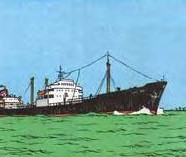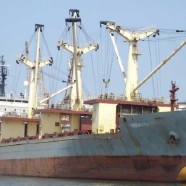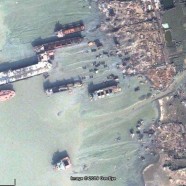“Shipbreaking” #21
The quarterly bulletin by Robin des Bois containing information and analysis on the demolition of ships, is about to be published.
– Bangladesh is seasick (p 1).
– Brutal demolition in Africa, ships flying the Togo flag for their last voyage (p 3).
– Turkey scraps old ships in the Mediterranean (p 4).
– A unique (hopefully) barratry brought to light thanks to bulletin #20 of shipbreaking.com (p 5).
– A supply oil ship of the Japanese whaling fleet goes to be dismantled in India (p14).
“Shipbreaking” #20
The 20th delivery of Shipbreaking.com Robin des Bois’s editorial success devoted to the scrapping of vessels is on Robin des Bois’s internet newsstand.
This initiative is entirely funded by Robin des Bois.
-45 pages to find out everything on the subject
-Asbestos in new vessels
-The Aristos II (page 8) tanker from Trafigura’s armada- waste in Ivory Coast- which could have been used instead of the Probo Koala sent to be scrapped… in Bangladesh
-The European Union finances the sinking of 57 polluted wrecks in Mauritania!
“Shipbreaking” #19
Between January 1st and April 4th 2010, 233 ships were sent to be demolished. The rhythm remains elevated, with 18 ships per week. In number of ships to be demolished as well as tonnage, India, with 120 ships (42%), remains destination number 1 before Bangladesh with 55 (24%), Pakistan with 25 (11%), and China with 23 (9%). The accumulated demolition will permit the recycling of nearly 2 million tons of metal.
The crisis is over !
The prices offered by the demolition yards have significantly increased and continue to increase in the yards of the Indian subcontinent, but also in China; they have reached $400, even $500 for oil tankers and more for ships containing stainless steel. The record of the trimester was obtained by the Norwegian chemical tanker Spirit, bought for $780 per ton by an Indian yard, a price rarely reached even in 2008.
“Shipbreaking” #16
The shame remains but the crime scene has disappeared.
In October 1992, the Renata (then named MC Ruby) was owned by MC Shipping Company, a subsidiary of the Vlassov Group based in Monaco; her ship manager was V Ships, another subsidiary company of the group. The ship was loaded with cocoa in Ghana and was bound for Le Havre, Amsterdam and Hamburg. During the trip, nine stowaways were discovered, stripped of their money and confined in the forepeak ; they were brought up on the deck by night, then struck and thrown on the high seas between Takoradi and Le Havre. The only survivor alerted officials in Le Havre. On December 9th 1995, at the end of a four week trial, the master and the chief-mate were condemned to a life sentence and three other members of the Ukrainian crew to 20 years of detention. Neither the Vlassov group, nor their subsidiary companies (MC Shipping and V. Ships) have been sued, in spite of the degraded conditions imposed on the crew and the many additional traffics on the ship which were highlighted and known to all. The significant bond between the ship management and the crew was not retained. See« Coke en stock », La Flèche, hiver 1996 and « Le désert des Barbares » communiqué de Robin des Bois, 9 décembre 1995.
“Shipbreaking” #15
Goodbye Bangladesh, hello Philippines?
On March 18th 2009 the Bangladeshi High Court of Justice ordered the closure within two weeks of all ship-breaking yards operating without environmental clearance. Considering the state of all the ship-breaking yards in the country this would mean completely closing down the field. The decision also prohibits the importation of vessels which have not undergone any preliminary extraction of hazardous materials (asbestos, PCBs, heavy metals, hydrocarbons …) To prepare an appeal against this decision the industries obtained a delay of three weeks. In the meantime, the vessels continue to arrive and are beached in Chittagong. We are left to see how this decision will be followed up, the decisions effects and if it will encourage the Bangladeshi government to put standards in place and follow up the environmental and social conditions of ship-breaking or if the demolition market will move elsewhere: due to the crisis the Japanese ship owners have an influx of vessels to be demolished and are pushing the Filipino government to launch into the demolition business.











